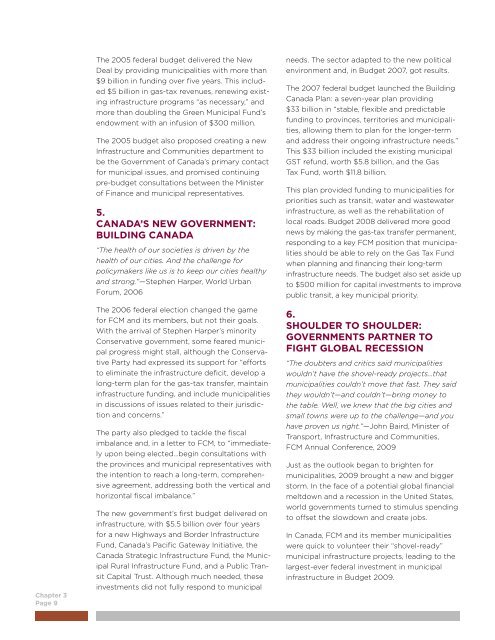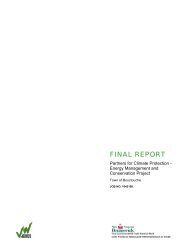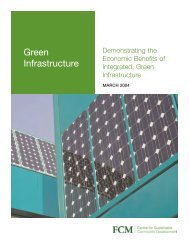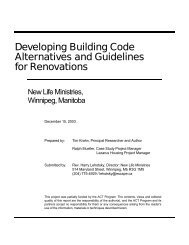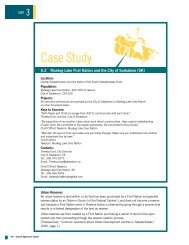The State of Canada's Cities and Communities 2012 - FCM
The State of Canada's Cities and Communities 2012 - FCM
The State of Canada's Cities and Communities 2012 - FCM
Create successful ePaper yourself
Turn your PDF publications into a flip-book with our unique Google optimized e-Paper software.
Chapter 3<br />
Page 9<br />
<strong>The</strong> 2005 federal budget delivered the New<br />
Deal by providing municipalities with more than<br />
$9 billion in funding over five years. This included<br />
$5 billion in gas-tax revenues, renewing existing<br />
infrastructure programs “as necessary,” <strong>and</strong><br />
more than doubling the Green Municipal Fund’s<br />
endowment with an infusion <strong>of</strong> $300 million.<br />
<strong>The</strong> 2005 budget also proposed creating a new<br />
Infrastructure <strong>and</strong> <strong>Communities</strong> department to<br />
be the Government <strong>of</strong> Canada’s primary contact<br />
for municipal issues, <strong>and</strong> promised continuing<br />
pre-budget consultations between the Minister<br />
<strong>of</strong> Finance <strong>and</strong> municipal representatives.<br />
5.<br />
CANADA’S NEW GOVERNMENT:<br />
BUILDING CANADA<br />
“<strong>The</strong> health <strong>of</strong> our societies is driven by the<br />
health <strong>of</strong> our cities. And the challenge for<br />
policymakers like us is to keep our cities healthy<br />
<strong>and</strong> strong.”—Stephen Harper, World Urban<br />
Forum, 2006<br />
<strong>The</strong> 2006 federal election changed the game<br />
for <strong>FCM</strong> <strong>and</strong> its members, but not their goals.<br />
With the arrival <strong>of</strong> Stephen Harper’s minority<br />
Conservative government, some feared municipal<br />
progress might stall, although the Conservative<br />
Party had expressed its support for “efforts<br />
to eliminate the infrastructure deficit, develop a<br />
long-term plan for the gas-tax transfer, maintain<br />
infrastructure funding, <strong>and</strong> include municipalities<br />
in discussions <strong>of</strong> issues related to their jurisdiction<br />
<strong>and</strong> concerns.”<br />
<strong>The</strong> party also pledged to tackle the fiscal<br />
imbalance <strong>and</strong>, in a letter to <strong>FCM</strong>, to “immediately<br />
upon being elected…begin consultations with<br />
the provinces <strong>and</strong> municipal representatives with<br />
the intention to reach a long-term, comprehensive<br />
agreement, addressing both the vertical <strong>and</strong><br />
horizontal fiscal imbalance.”<br />
<strong>The</strong> new government’s first budget delivered on<br />
infrastructure, with $5.5 billion over four years<br />
for a new Highways <strong>and</strong> Border Infrastructure<br />
Fund, Canada’s Pacific Gateway Initiative, the<br />
Canada Strategic Infrastructure Fund, the Municipal<br />
Rural Infrastructure Fund, <strong>and</strong> a Public Transit<br />
Capital Trust. Although much needed, these<br />
investments did not fully respond to municipal<br />
needs. <strong>The</strong> sector adapted to the new political<br />
environment <strong>and</strong>, in Budget 2007, got results.<br />
<strong>The</strong> 2007 federal budget launched the Building<br />
Canada Plan: a seven-year plan providing<br />
$33 billion in “stable, flexible <strong>and</strong> predictable<br />
funding to provinces, territories <strong>and</strong> municipalities,<br />
allowing them to plan for the longer-term<br />
<strong>and</strong> address their ongoing infrastructure needs.”<br />
This $33 billion included the existing municipal<br />
GST refund, worth $5.8 billion, <strong>and</strong> the Gas<br />
Tax Fund, worth $11.8 billion.<br />
This plan provided funding to municipalities for<br />
priorities such as transit, water <strong>and</strong> wastewater<br />
infrastructure, as well as the rehabilitation <strong>of</strong><br />
local roads. Budget 2008 delivered more good<br />
news by making the gas-tax transfer permanent,<br />
responding to a key <strong>FCM</strong> position that municipalities<br />
should be able to rely on the Gas Tax Fund<br />
when planning <strong>and</strong> financing their long-term<br />
infrastructure needs. <strong>The</strong> budget also set aside up<br />
to $500 million for capital investments to improve<br />
public transit, a key municipal priority.<br />
6.<br />
SHOULDER TO SHOULDER:<br />
GOVERNMENTS PARTNER TO<br />
FIGHT GLOBAL RECESSION<br />
“<strong>The</strong> doubters <strong>and</strong> critics said municipalities<br />
wouldn’t have the shovel-ready projects…that<br />
municipalities couldn’t move that fast. <strong>The</strong>y said<br />
they wouldn’t—<strong>and</strong> couldn’t—bring money to<br />
the table. Well, we knew that the big cities <strong>and</strong><br />
small towns were up to the challenge—<strong>and</strong> you<br />
have proven us right.”—John Baird, Minister <strong>of</strong><br />
Transport, Infrastructure <strong>and</strong> <strong>Communities</strong>,<br />
<strong>FCM</strong> Annual Conference, 2009<br />
Just as the outlook began to brighten for<br />
municipalities, 2009 brought a new <strong>and</strong> bigger<br />
storm. In the face <strong>of</strong> a potential global financial<br />
meltdown <strong>and</strong> a recession in the United <strong>State</strong>s,<br />
world governments turned to stimulus spending<br />
to <strong>of</strong>fset the slowdown <strong>and</strong> create jobs.<br />
In Canada, <strong>FCM</strong> <strong>and</strong> its member municipalities<br />
were quick to volunteer their “shovel-ready”<br />
municipal infrastructure projects, leading to the<br />
largest-ever federal investment in municipal<br />
infrastructure in Budget 2009.


